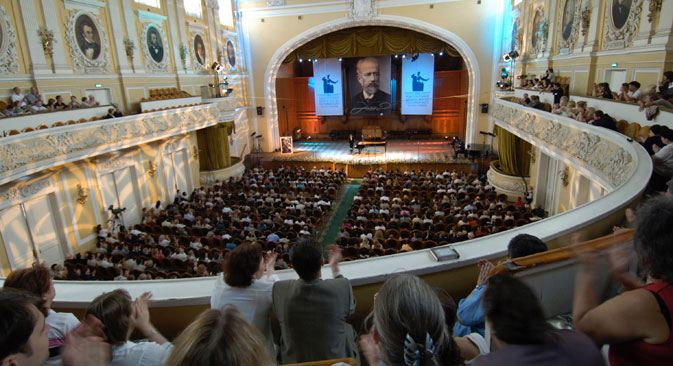
The International Tchaikovsky Competition is held once every four years.
Vladimir Vyatkin/Ria NovostiIn February, a new director was appointed to head the country’s major repository of Russian art, the Tretyakov Gallery in Moscow. The post went to Zelfira Tregulova, an international curator famous for exhibitions of Russian art held in Rome, London and New York, and former deputy head of the Kremlin Museums. The Russian Culture Ministry hopes that she will be instrumental in promoting Russian art abroad. Another task facing the new head is the refurbishment of the gallery’s buildings and expositions.
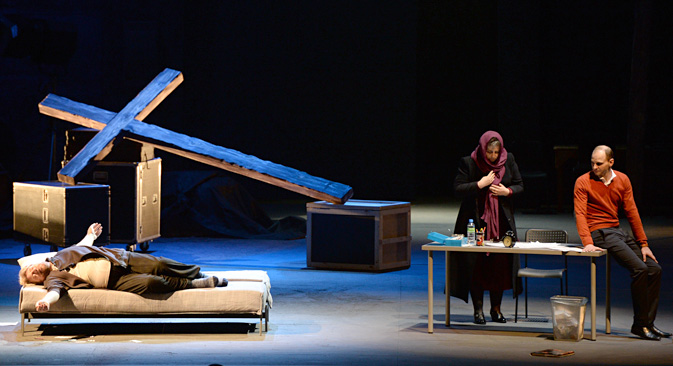 Richard Wagner's opera 'Tannhauser' on the stage of the Novosibirsk State Opera and Ballet Theatre. Source: Alexander Kryazhev / RIA Novosti
Richard Wagner's opera 'Tannhauser' on the stage of the Novosibirsk State Opera and Ballet Theatre. Source: Alexander Kryazhev / RIA Novosti
In the winter of 2015, following a complaint from Metropolitan Tikhon of Novosibirsk and Berdsk, administrative proceedings were launched against the director and manager of the Novosibirsk Opera and Ballet Theater, Boris Mezdrich, for the “deliberate public desecration of religious objects.”
The theater staged Wagner’s opera Tannhauser in December 2014. In the version of the opera staged by director Timofey Kulyabin, the action is set in the present day, with Jesus a character in an erotic film being made by knight Tannhauser.
Following the complaint by the Orthodox Church, the Russian Culture Ministry removed the production from the theater’s repertoire and sacked both the director and the manager. The scandal rumbled on throughout the year, with critics describing the controversy as “censorship in art.”
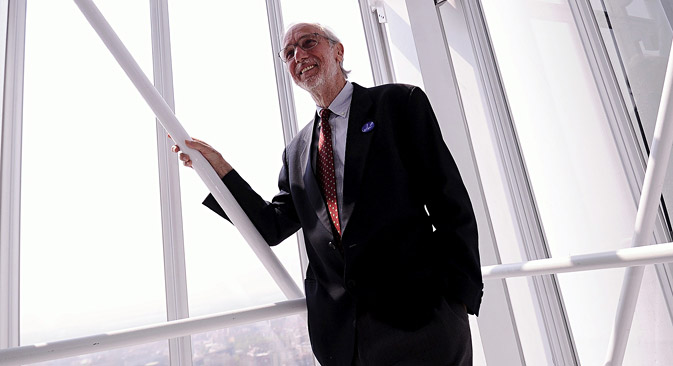 Italian architect Renzo Piano. Source: Reuters
Italian architect Renzo Piano. Source: Reuters
Three winners of the Pritzker Architecture Prize left a mark in Moscow this year, with two buildings and one project. In the summer, Rem Koolhaas opened the new building of the Garage Museum of Contemporary Art (having refurbished a former Soviet-era restaurant). In the fall, a business center designed by Zaha Hadid finally opened its doors 10 years after construction began.
Another refurbishment project – that of the GES-2 power plant in Moscow – will be carried out by Renzo Piano. He has been invited by Russian billionaire Leonid Mikhelson, who is planning to convert the plant into an arts center by the end of 2018.
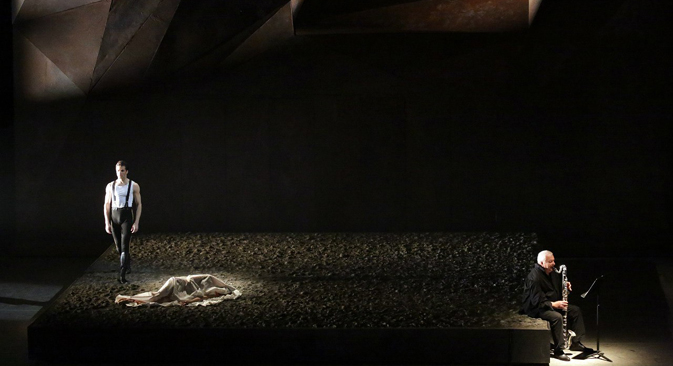 'Hero of Our Time'. Source: Press photo
'Hero of Our Time'. Source: Press photo
The ballet Hero of Our Time, which saw its premiere at the Bolshoi Theater on July 22, is a reminder of the kind of production the storied theater symbolized for the world for many decades: long ballets with many acts and a serious literary basis, complicated plot, exclusive music, compound decorations and hundreds of costumes.
Hero of Our Time meets all of these criteria and revives these traditions. Prepared during the year of the 200th anniversary of the birth of Mikhail Lermontov, the author of the novel of the same name, the ballet recreates one of the best-loved Russian novels through choreography.
The score for the ballet was composed by Ilya Demutsky, who is still under 30, while Russian drama star Kirill Serebrennikov worked on the libretto. Yuri Possokhov, who has staged Cinderella at the Bolshoi, as well as several performances for the San Francisco Ballet and many other companies, was appointed as the choreographer.
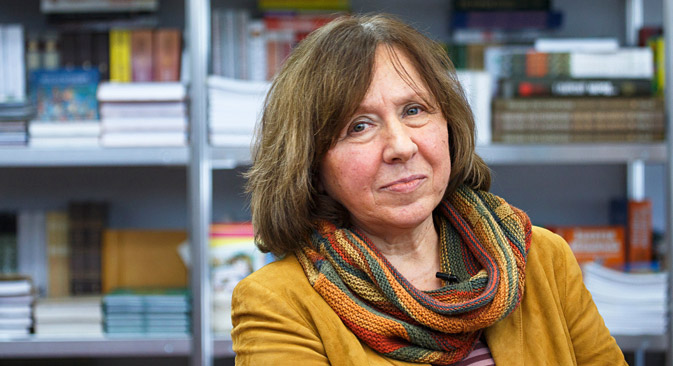 Svetlana Alexievich. Source: Reuters
Svetlana Alexievich. Source: Reuters
After a 28-year interval, the Nobel Prize in Literature was awarded to a Russian-language author, writer and journalist Svetlana Alexievich, the author of documentary fiction War’s Unwomanly Face, Enchanted with Death, and Chernobyl Prayer.
Technically, Alexievich is a Belarusian citizen but ever since Soviet times she has been writing in Russia and this is where her works have always been published. All her books are based on journalistic investigations and interviews with eyewitnesses of various tragic events in history. Thus, her Nobel Prize success has raised another important question in modern literature, that of the line between journalism and fiction.
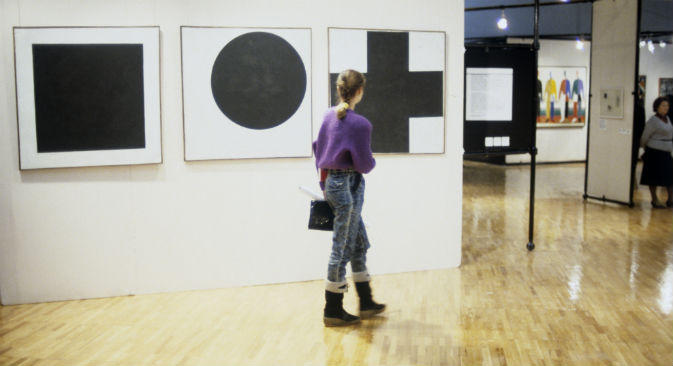 The original Black Square (1915) today hangs in the Tretyakov Gallery in Moscow on Krymsky Val. Source: RIA Novosti / Yuriy Somov
The original Black Square (1915) today hangs in the Tretyakov Gallery in Moscow on Krymsky Val. Source: RIA Novosti / Yuriy Somov
Large-scale exhibitions of Russian avant-garde art have been traveling around the world for the past couple of years, yet a formal cause for celebrating the centenary of the movement came in the summer. On Jun. 21, 1915, Kazimir Malevich created his famous Black Square, which became a global symbol of suprematism and avant-garde art. The Basel-based Fondation Beyeler even recreated the legendary Last Futurist Exhibition 0.10 at which Black Square was first shown to the public.
 The International Tchaikovsky Competition is held once every four years. Source: Vladimir Vyatkin/Ria Novosti
The International Tchaikovsky Competition is held once every four years. Source: Vladimir Vyatkin/Ria Novosti
In the summer, Moscow and St. Petersburg hosted the 15th International Tchaikovsky Competition, which in the 60 years since its inception has become one of the most respected classical music competitions and has launched the careers of many world-class performers.
This year’s favorites included tenor from Mongolia Ariunbaatar Ganbaatar, South Korean tenor Myonghyun Lee, and pianists Lucas Debargue from France and Dmitry Masleyev from Russia.
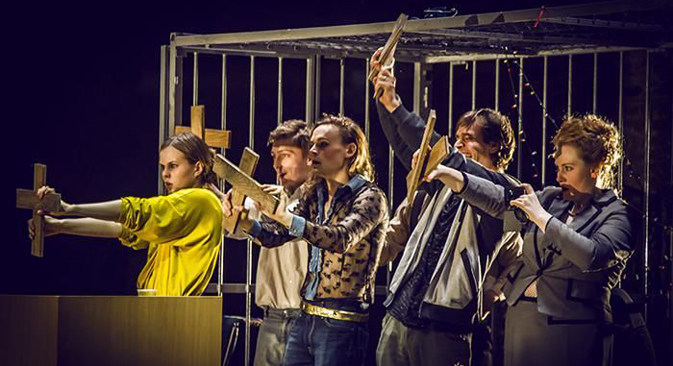 'Idiots' Kirill Serebrennikov. Source: Press photo
'Idiots' Kirill Serebrennikov. Source: Press photo
Since the “Russian seasons” of 1997, Russian drama directors have been conspicuous by their absence from the program of the main event on the theater calendar, the Avignon Festival. Until this summer, when the artistic director of the Moscow-based Gogol Center, Kirill Serebrennikov, was invited to present his production of Idiots, inspired by the Lars von Trier film of the same name.
For its part, Moscow welcomed the theater legend Robert Wilson, who staged Pushkin’s Fairy Tales at the Theater of Nations, described by critics as “the production of the year” in Russia.
All rights reserved by Rossiyskaya Gazeta.
Subscribe
to our newsletter!
Get the week's best stories straight to your inbox